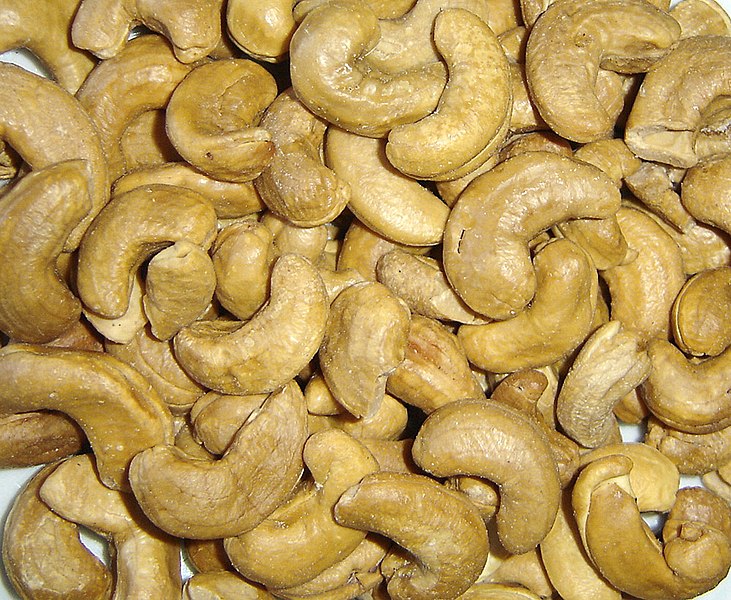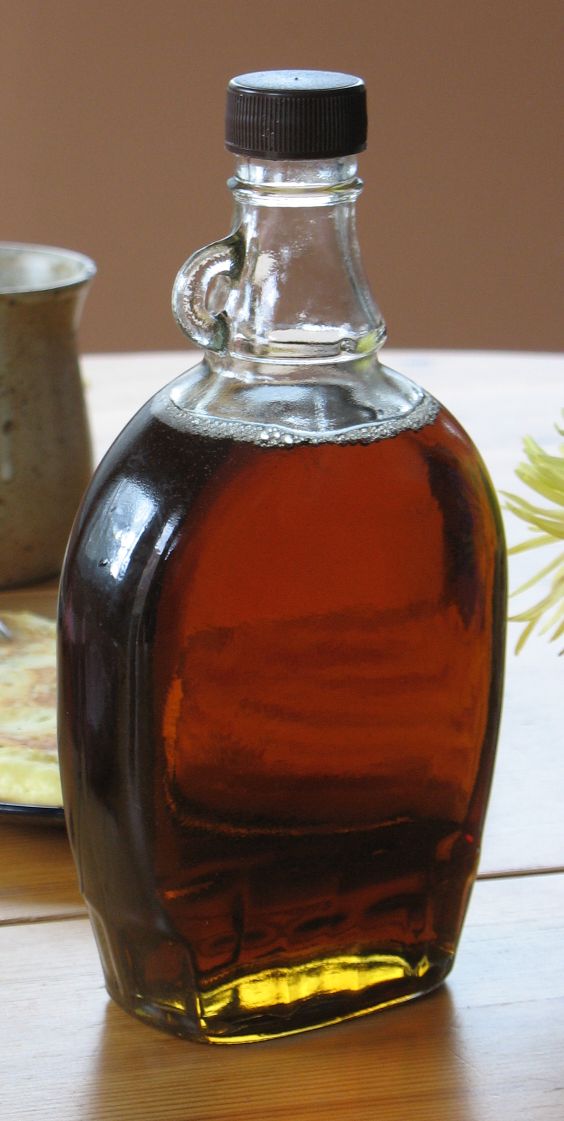Cashews vs. Maple Syrup
Nutrition comparison of Cashews and Maple Syrup
Ever wonder how your favorite foods stack up against each other in terms of nutrition?
We compared the nutritional contents of
cashews
versus
maple syrup
(100g each)
below using 2020 USDA and NIH data[1].
For a quick recap of significant nutrients and differences in cashews and maple syrup:
- Both maple syrup and cashews are high in calories, carbohydrates and potassium.
- Cashew has more thiamin, niacin, pantothenic acid, Vitamin B6 and folate, however, maple syrup contains more riboflavin.
- Cashew is an excellent source of dietary fiber, iron and protein.
- Maple syrup is an excellent source of calcium.
USDA sources for nutritional information: Cashews (Nuts, cashew nuts, raw) and Maple Syrup (Syrups, maple) . Have a correction or suggestions? Shoot us an email.
Calories and Carbs
calories
Both maple syrup and cashews are high in calories. Cashew has 113% more calories than maple syrup - maple syrup has 260 calories per 100 grams and cashew has 553 calories.
For macronutrient ratios, cashews is heavier in protein, much lighter in carbs and much heavier in fat compared to maple syrup per calorie. Cashews has a macronutrient ratio of 12:21:67 and for maple syrup, 0:100:0 for protein, carbohydrates and fat from calories.
Macro Ratios from Calories:
| Cashews | Maple Syrup | |
|---|---|---|
| Protein | 12% | ~ |
| Carbohydrates | 21% | 100% |
| Fat | 67% | ~ |
| Alcohol | ~ | ~ |
carbohydrates
Both maple syrup and cashews are high in carbohydrates. Maple syrup has 122% more carbohydrates than cashew - maple syrup has 67g of total carbs per 100 grams and cashew has 30.2g of carbohydrates.
dietary fiber
Cashew is an excellent source of dietary fiber and it has more dietary fiber than maple syrup - cashew has 3.3g of dietary fiber per 100 grams and maple syrup does not contain significant amounts.
sugar
Maple syrup is high in sugar and cashew has 90% less sugar than maple syrup - maple syrup has 60.5g of sugar per 100 grams and cashew has 5.9g of sugar.
Protein
protein
Cashew is an excellent source of protein and it has 454 times more protein than maple syrup - maple syrup has 0.04g of protein per 100 grams and cashew has 18.2g of protein.
Fat
saturated fat
Cashew is high in saturated fat and maple syrup has 100% less saturated fat than cashew - maple syrup has 0.01g of saturated fat per 100 grams and cashew has 7.8g of saturated fat.
Vitamins
Vitamin C
Cashews and maple syrup contain similar amounts of Vitamin C - cashew has 0.5mg of Vitamin C per 100 grams and maple syrup does not contain significant amounts.
Vitamin E
Cashew has more Vitamin E than maple syrup - cashew has 0.9mg of Vitamin E per 100 grams and maple syrup does not contain significant amounts.
Vitamin K
Cashew has more Vitamin K than maple syrup - cashew has 34.1ug of Vitamin K per 100 grams and maple syrup does not contain significant amounts.
The B Vitamins
Cashew has more thiamin, niacin, pantothenic acid, Vitamin B6 and folate, however, maple syrup contains more riboflavin.
| Cashews | Maple Syrup | |
|---|---|---|
| Thiamin | 0.423 MG | 0.066 MG |
| Riboflavin | 0.058 MG | 1.27 MG |
| Niacin | 1.062 MG | 0.081 MG |
| Pantothenic acid | 0.864 MG | 0.036 MG |
| Vitamin B6 | 0.417 MG | 0.002 MG |
| Folate | 25 UG | ~ |
Minerals
calcium
Maple syrup is an excellent source of calcium and it has 176% more calcium than cashew - maple syrup has 102mg of calcium per 100 grams and cashew has 37mg of calcium.
iron
Cashew is an excellent source of iron and it has 59 times more iron than maple syrup - maple syrup has 0.11mg of iron per 100 grams and cashew has 6.7mg of iron.
potassium
Both maple syrup and cashews are high in potassium. Cashew has 211% more potassium than maple syrup - maple syrup has 212mg of potassium per 100 grams and cashew has 660mg of potassium.
Omega-3 and Omega-6
omega 6s
Comparing omega-6 fatty acids, cashew has more linoleic acid than maple syrup per 100 grams.
| Cashews | Maple Syrup | |
|---|---|---|
| other omega 6 | 0.266 G | ~ |
| linoleic acid | 7.782 G | 0.017 G |
| Total | 8.048 G | 0.017 G |
Customize your serving size
The comparison below is by weight, but sometimes 100g isn't that intuitive of a measurement for food. View a custom portion comparison (e.g. cups, oz, package).
You can try adding or subtracting the amount of either Cashews or Maple Syrup .
Note: The specific food items compared are: Cashews (Nuts, cashew nuts, raw) and Maple Syrup (Syrups, maple) .
Cashews g
()
|
Daily Values (%) |
Maple Syrup g
()
|
|||||
|---|---|---|---|---|---|---|---|
| KCAL % |
|
5% | calories | 5% |
|
KCAL % | |
| G % |
|
5% | carbohydrates | 5% |
|
G % | |
| G % |
|
5% | dietary fiber | 5% |
|
G % | |
| G | 5% | sugar | 5% | G | |||
| G % |
|
5% | total fat | 5% |
|
G % | |
| G % |
|
5% | saturated fat | 5% |
|
G % | |
| G | 5% | monounsaturated fat | 5% | G | |||
| G | 5% | polyunsaturated fat | 5% | G | |||
| G | 5% | trans fat | 5% | G | |||
| MG | 5% | cholesterol | 5% | MG | |||
| MG % |
|
5% | sodium | 5% |
|
MG % | |
| 5% | Vitamins and Minerals | 5% | |||||
| UG % |
|
5% | Vitamin A | 5% |
|
UG % | |
| MG % |
|
5% | Vitamin C | 5% |
|
MG % | |
| IU % |
|
5% | Vitamin D | 5% |
|
IU % | |
| MG % |
|
5% | calcium | 5% |
|
MG % | |
| MG % |
|
5% | iron | 5% |
|
MG % | |
| MG % |
|
5% | magnesium | 5% |
|
MG % | |
| MG % |
|
5% | potassium | 5% |
|
MG % | |
| MG % |
|
5% | thiamin (Vit B1) | 5% |
|
MG % | |
| MG % |
|
5% | riboflavin (Vit B2) | 5% |
|
MG % | |
| MG % |
|
5% | niacin (Vit B3) | 5% |
|
MG % | |
| MG % |
|
5% | Vitamin B6 | 5% |
|
MG % | |
| MG % |
|
5% | pantothenic acid (Vit B5) | 5% |
|
MG % | |
| UG % |
|
5% | folate (Vit B9) | 5% |
|
UG % | |
| UG % |
|
5% | Vitamin B12 | 5% |
|
UG % | |
| MG % |
|
5% | Vitamin E | 5% |
|
MG % | |
| UG % |
|
5% | Vitamin K | 5% |
|
UG % | |
| G % |
|
5% | protein | 5% |
|
G % | |
| UG % |
|
5% | biotin (Vit B7) | 5% |
|
UG % | |
| MG % |
|
5% | choline | 5% |
|
MG % | |
| MG % |
|
5% | chlorine | 5% |
|
MG % | |
| UG % |
|
5% | chromium | 5% |
|
UG % | |
| MG % |
|
5% | copper | 5% |
|
MG % | |
| UG % |
|
5% | fluoride | 5% |
|
UG % | |
| UG % |
|
5% | iodine | 5% |
|
UG % | |
| MG % |
|
5% | manganese | 5% |
|
MG % | |
| UG % |
|
5% | molybdenum | 5% |
|
UG % | |
| MG % |
|
5% | phosphorus | 5% |
|
MG % | |
| UG % |
|
5% | selenium | 5% |
|
UG % | |
| MG % |
|
5% | zinc | 5% |
|
MG % | |
| G | 5% | Water | 5% | G | |||
| G | 5% | Starch | 5% | G | |||
| G | 5% | Alcohol | 5% | G | |||
FAQ
Does maple syrup or cashews contain more calories in 100 grams?Both maple syrup and cashews are high in calories. Cashew has 110% more calories than maple syrup - maple syrup has 260 calories in 100g and cashew has 553 calories.
Does maple syrup or cashews have more carbohydrates?
By weight, both maple syrup and cashews are high in carbohydrates. maple syrup has 120% more carbohydrates than cashew - maple syrup has 67g of carbs for 100g and cashew has 30.2g of carbohydrates.
Does maple syrup or cashews contain more calcium?
Maple syrup is a rich source of calcium and it has 180% more calcium than cashew - maple syrup has 102mg of calcium in 100 grams and cashew has 37mg of calcium.
Does maple syrup or cashews contain more iron?
Cashew is an abundant source of iron and it has 59 times more iron than maple syrup - maple syrup has 0.11mg of iron in 100 grams and cashew has 6.7mg of iron.
Does maple syrup or cashews contain more potassium?
Both maple syrup and cashews are high in potassium. Cashew has 210% more potassium than maple syrup - maple syrup has 212mg of potassium in 100 grams and cashew has 660mg of potassium.

